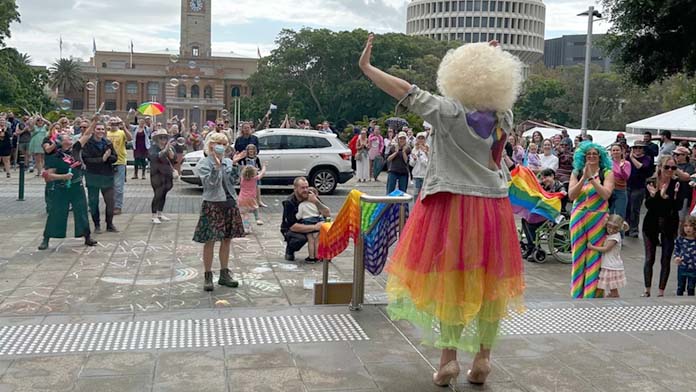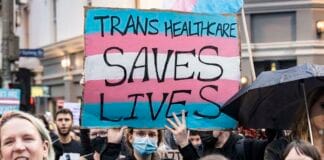Transphobic mobilisations must be opposed, writes Sophie Cotton, but this should be linked to a fight against the broader institutional transphobia in the political mainstream
A recent spike in transphobia has seen drag show readings, a prominent queer comedy show and protests cancelled or postponed due to safety concerns or police advice.
While it’s understandable that individual councils faced with the vitriol of the transphobic right for the first time may have these reactions, the fact remains that the LGBTIQ movement and supporters need to stand up and defend the right of trans and gender diverse people to exist.
Happily, we’re already beginning to see community organisers standing up to the bigotry, loud and proud.
But to really win change will need further-reaching struggle. Far from accepting the idea that queer events can now only be safe online, we need a militant movement for trans rights against the bigots but which also mobilises to fight the structural roots of transphobia.
When Yarra Plenty Regional Council in Melbourne moved a drag story time online, they cited the “safety of our rainbow families and staff” after threats of far-right protests. Reuben Kaye postponed his comedy show in Sydney due to “the audience’s safety, the other comedians’ safety, my safety, my band’s safety and the safety of the businesses on Enmore Road”, after threats of protest from so-called “Christian Lives Matter”.
These threats are a concerning political trend of right-wing intimidation that must be addressed.
We can’t allow the fear of bigots’ protests to become disabling and deliver the right-wing what they wanted in the first place: queer events getting shut down.
The old union saying is: if you don’t fight you lose. You can only win if you are prepared to stand up to bigotry.
“Timberlina”, a First Nations drag queen, admitted to Mamamia to being afraid after protesters announced they would target her monthly drag story time event. But she decided to go ahead with the event, or in her words “absolutely turning up” in the face of “hate and outdated views”.
In response, hundreds of locals showed up outside Newcastle library in a celebration and demonstration of support for the LGBTIQ community, wearing glitter and face paint, rainbow and trans flags. The handful of anti-gay protesters left early to avoid the celebratory scene.
There have been similar mobilisations around the country. After anti-gay activists destroyed hundreds of copies of the queer edition of the student newspaper, the Sydney University Queer Action Collective not only organised a reprint, but also a protest on campus to demonstrate support for the LGBTIQ community.
And in Melbourne a group of “Rainbow Angels” have donned giant angel wings to visually protect kids and families from the isolated and dwindling number of bigots who come to protest these events.
Every example of queer culture that stands up to these bigots shows the deep vein of support that exists for LGBTIQ people. Not only can we continue in a tradition of out and proud queer community and culture, we can turn around the right-wing attacks, so that it is the bigots who are afraid and skulking away, not gay and trans people!
Why counter-protests aren’t enough
It can be tempting to see the bigots from the far right or transphobic feminists as the main villains responsible for transphobia, and therefore as the main transphobic threat.
But counter-protests alone won’t dismantle the structural and institutional transphobia that breeds the individual instances of bigotry.
These latest spikes in transphobia haven’t come from nowhere. They come directly from the political mainstream—primarily the new obsession of the Republican right in the US, which has introduced a record-breaking 558 anti-trans bills across the country so far this year alone. And it’s this onslaught of anti-trans politics that has fed the confidence of bigots here in Australia.
Australia’s political elite are not so different. Former Prime Minister Scott Morrison experimented several times with the same brand of activist transphobia, from his gender whisperer comments in 2018 and his “Religious Discrimination Bill” to his parachuting of outspoken anti-trans feminist Katherine Deves into the seat of Warringah.
Until recently, the “Gender” section of The Australian newspaper was dedicated to anti-trans articles. As recently as June, it published a shocking article claiming that the two 15-year-olds who killed transgender woman Brianna Ghey in the UK had been “ignored” as victims, and that the “trans lobby” and “extreme trans activism” had “destroyed” their lives.
The fact that each attempt saw Morrison and the Liberals fall flat on their faces was thanks to the level of social support for LGBTIQ rights built over years of campaigning, and particularly the strength of the social movements and unions that won us marriage equality.
But even with the Liberals kicked out of federal and all mainland state governments, there are deeper roots of transphobia to contend with.
Structural transphobia
Trans people face discrimination across all facets of society. This is an extension of the sexism and homophobia that permeates capitalism. Our entire society is organised around sex segregation; at work, in families, schools and sports, and this is reinforced in laws and by the media. Rigid sex roles and stereotypes are everywhere, and closely policed.
There are huge obstacles to being trans, from barriers to transition, barriers to the workplace, and barriers to public life altogether.
This includes the disgraceful NSW law forcing transgender people to undergo a “surgical procedure involving the alteration of a person’s reproductive organs” and to have this examined by two doctors in order to legally change their gender.
Queensland introduced changes in June to remove a similar requirement, allowing people to change their gender by providing a supporting statement from someone they have known for more than 12 months.
Forcing trans people to undergo surgery to be legally recognised is a barbaric practice that encourages misgendering across society.
For those transgender people who may choose to “medically transition”, by undergoing surgery, hormonal treatments or other procedures, the costs are often prohibitively expensive. Many gender affirming procedures are classed as “cosmetic” and are not covered by Medicare.
On top of that, most workplaces do not provide sufficient gender affirmation leave to allow you to affordably access medical care. Surgeries can cost tens of thousands of dollars and can require six or more weeks of leave, during which time people often lose employment and are forced to request Centrelink payments.
As if that wasn’t enough, religious institutions including schools and other services still have the right to fire staff and expel students for their gender identity, sexuality or even pregnancy and marital status.
The federal Labor government has delayed any changes to this, with a law reform inquiry not even due to report until the end of this year.
Discriminatory attitudes can make getting a job while being openly trans extremely difficult. A survey of 1000 employers in the UK by Crossland Solicitors found transphobic attitudes are rife among bosses.
One in three admitted to being “less likely” to hire a trans person, with just 24 per cent suggesting they would (the remainder were “unsure”). This was even higher in service facing jobs, with almost half of retail employers admitting it was unlikely they’d hire a trans person.
It’s unsurprising then that trans people are overwhelmingly excluded from the formal economy. A 2020 survey of trans and gender diverse people in Australia found that just 52 per cent were formally employed. Trans people were more likely than the population at large to rely financially on government support, partners or friends, or sex work.
This officially mandated transphobia trickles down throughout society, encouraging transphobic policies across institutions and individuals. And the realities of trans oppression are used by transphobic politicians to push bigotry that is parroted across the mainstream press and by the people consuming it.
All of this fans the flames of the everyday transphobia trans people face, from being misgendered by family or coworkers, being harassed on the street, or cisnormative comments and assumptions from friends.
Labor plays both sides
Just because Labor by and large avoids the kind of brazen anti-trans nonsense of Scott Morrison and the Liberals, we cannot lose sight of the fact that they are presiding over a transphobic system, and that “neutrality” is not possible.
Albanese’s strategy has been to attempt to avoid the trans question as much as possible, trying to walk an impossible line between being neither “too pro-trans” nor “too anti-trans”. He was the first Prime Minister to march in the highly corporatised Mardi Gras, but courts right-wing praise by refusing to confront leading questions that tacitly suggest that trans people don’t exist.
In his recent interview with British journalist Piers Morgan, he dodged a leading question as to the definition of a woman, a far right talking point aiming to show that transgender women should not be considered women, calling women “adult human females”.
With Labor now in power federally and in every mainland state, they have the power to repeal every transphobic law on the books, provide free Medicare for trans healthcare, and to make efforts to stamp out transphobia, including through restoring the Safe Schools program.
As long as transphobic laws are sitting on the books, and systemic transphobia proliferates unabated, the spikes in transphobia from the far right and the Liberal Party are inevitable. The only way to squash the hard-core bigots is to turn our eyes on the transphobic mainstream and attack the problem from its root.
We simply cannot afford to let Anthony Albanese and state premiers including NSW’s Chris Minns off the hook on trans rights—and there should certainly not be a place for transphobic “debate” in The Greens.
Trans people need more than platitudes and statements about inclusivity. They need action on structural transphobia, which has far worse consequences for trans people than the idiotic tweets of the most vicious transphobic feminist.
The right-wing always complains about “radical” trans activists. But what the word “radical” actually means is to grasp something by its roots.
This is exactly the radicalism we need right now: one that connects the fight against the most explicit bigotry to the fight against the mainstream politicians, bosses, and media moguls who plant the seeds of transphobia.





